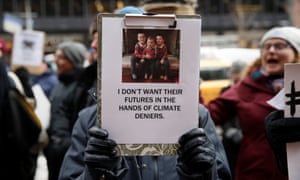Communicating climate change: a psychoanalysis – Science Weekly podcast
What is the psychology behind climate change denial? Can it be overcome? And what communication tips can scientists take from political campaigns?
Subscribe & Review on iTunes, Soundcloud, Audioboom, Mixcloud & Acast, and join the discussion on Facebook and Twitter
Tomorrow, Donald J Trump will be inaugurated as the 45th President of the United States of America. He’s arguably the least-qualified candidate ever to take office, and uncertainty surrounding the next four years in global politics is at an all-time high, with immigration, healthcare, international relations, and climate change all in the spotlight. But what lies behind his – and many others’ - denial of anthropogenic climate change? And how can insight into human psychology help tailor more effective messages of persuasion?
In this special edition of Science Weekly, Ian Sample first hears from Debika Shome, now of the TCC group, and co-author of a 2009 report from Columbia University’s Centre for Research on Environmental Decisions. Shome explains some of the psychological aspects at play and how they might be overcome. We also hear from Western University’s Professor Tima Bansal, who reveals how corporations weigh into the climate change debate. Finally, Ian asks Matthew McGregor – “Obama’s digital attack dog” – what the world of climate change communication can learn from political campaigns.
- Follow us on Twitter: @iansample, @maxjsanderson, and @guardianaudio
- Find other Guardian podcasts, including Football Weekly, the Story and Audio long reads

The Guardian is editorially independent. And we want to keep our journalism open and accessible to all. But we increasingly need our readers to fund our work.
Support The Guardian
View all comments >